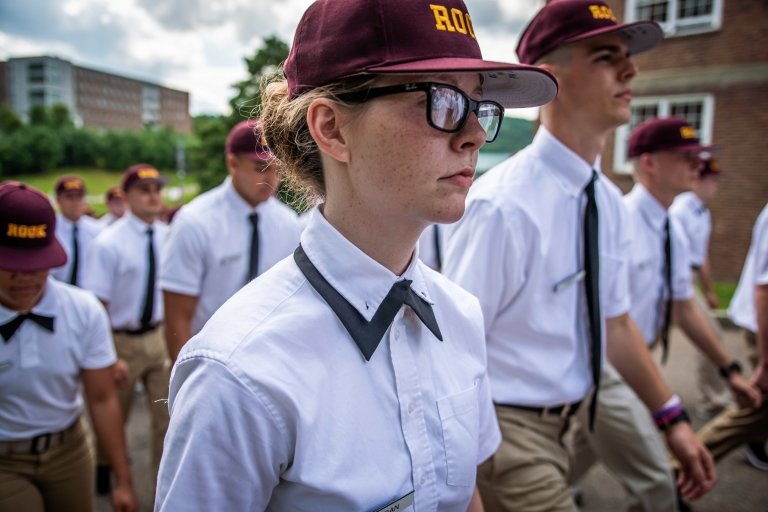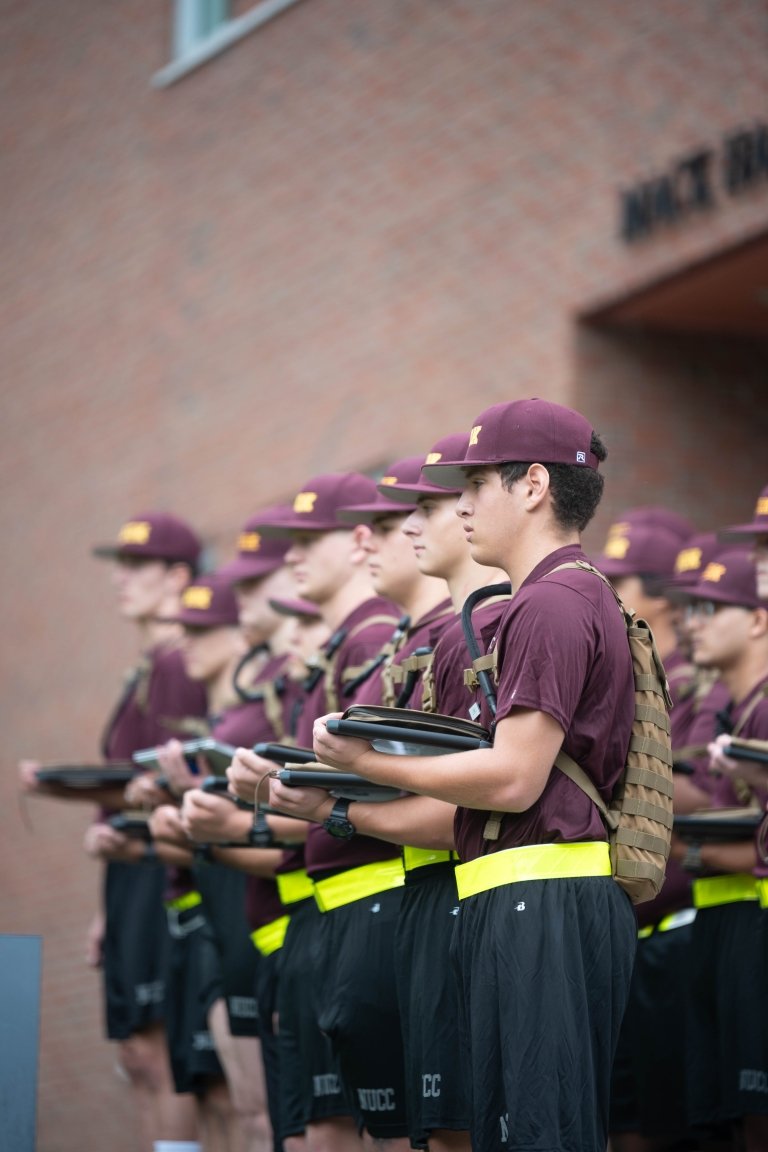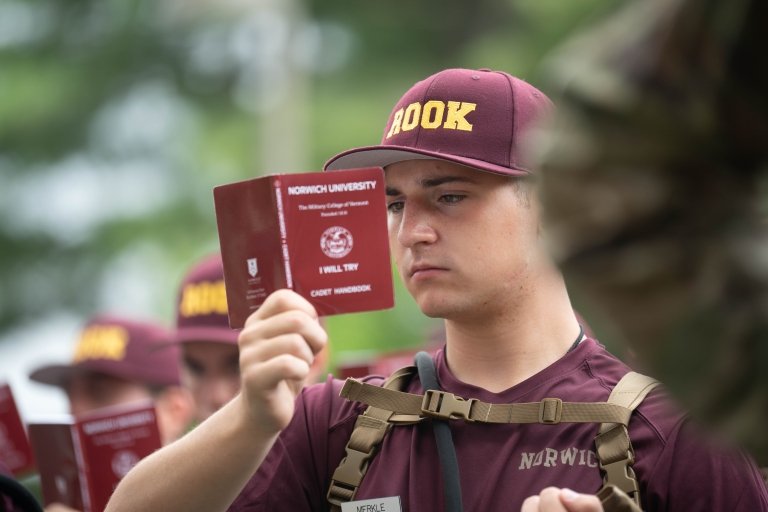Building Grit and Resiliency
Norwich University's Counselor Embed Program yields results two years in, as Rook succeed at a higher rate.
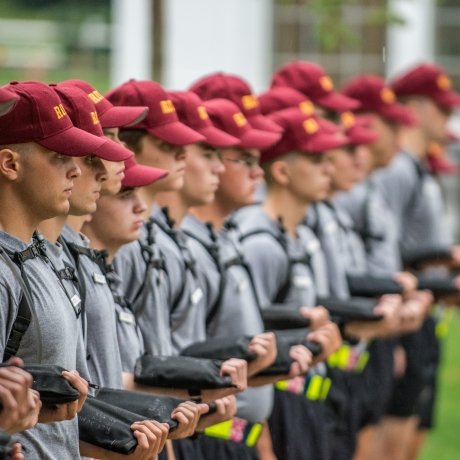
“When we saw how many crisis calls the Counseling and Wellness Program received during Rook Orientation Week a couple years ago, we knew we needed to try something different,” says Commandant and Vice President of Student Affairs, BG Bill McCollough ’91, VSM. “We needed to build a plan that would build grit and prevent crisis instead of just responding to it.”
Ensuring Rooks are put in the best possible position to succeed is paramount, especially during their first week on The Hill. BG McCollough and Director of the Counseling and Wellness Center, Nicole Krotinger, agreed that there was an opportunity to efficiently and effectively address the stresses that inevitably arise during Rook Week. “So, Nicole and I got our people together and we built a framework for the Counselor Embed Program,” says BG McCollough.
The framework of the program followed the model put into America’s very own military, supported by research and expert opinion surrounding the effective integration of mental health professionals into military training. This entailed embedding therapists into military training programs, rather than working with cadets behind closed office doors.
“Coming out of COVID-19, we had deficiencies in students’ ability to deal with adversity,” says Company Mentor CSM Paul Putney ’13, VSM, who saw Rooks struggling to adapt to Corps life firsthand. “In order to maximize the results from training, we needed to bring the counselors closer.”
“Four of our mental health counselors partner with Norwich company mentors in each of the four Rook companies during their Rook Week experience out in the field,” says Krotinger. “Our counselors are introduced as part of the company and are on-hand during the training exercises to support the incoming freshman, as well as the Corps leadership, in having a successful week.”
The embedded therapists work to identify and address mental health issues in their early stages. The goal is to prevent them from becoming more severe, as early intervention can lead to quicker recoveries and a reduction in the long-term psychological impact in the face of adversity. “We are getting them out of that fight-or-flight mentality when they’re faced with tough situations,” says CSM Putney. “Previously, we wanted them to simply deal with it and they just didn’t have that skill set. These counselors teach them skills to handle the stress that they didn’t have when they arrived.”
“One of the intentions of this embedded model was to make sure our services were directly accessible to Rooks, but to also aim to create less wait times for the queue of students both in the civilian and Corps lifestyles that, historically, would quickly develop in those first stressful couple weeks of a new school year,” says Senior Mental Health Counselor Will Kraman.
Having resources directly embedded into the companies allows Rooks to address issues as they arise and prevent them from turning into something more. “It’s a little bit like an athletic trainer,” says BG McCollough. “We wouldn’t try to run the football team without athletic trainers who can notice that a person’s stride is a bit off, or that they’ve got a strain and something’s not right. Let’s pull them aside before they do some damage and can’t play for the rest of the season.”
“We wouldn’t want to have it where you pull someone off Sabine Field, have them spend 15 minutes walking to an office to set up an appointment for an hour and a half later. That would be terrible, we just wouldn’t do that,” he says. “We have a Counseling and Wellness Center with trained assets, I wanted to get them closer to the point of friction where people are tasting stress for the first time. Let’s get them used to the taste and give them the tools to get through it.”
Clinical Director Melissa Marcellino has seen Rook Week evolve during her time on The Hill but says one thing has remained consistent. “There have always been Rooks experiencing mental health crises and utilizing our after-hours services.”
During the initial implementation of the program in 2023, she saw immediate improvement. “I was delighted to find that we did not receive a single after-hours crisis call that week,” she says. “It is my belief that supporting the cadre and Rooks in the field helped to mitigate the effects of stress on the new recruits and may have contributed to higher levels of self-regulation for student leaders, allowing them to more effectively do their jobs.”
BG McCollough noticed the same, and says he saw it beneficial for the building of grit and resiliency. “Those things can be difficult to build, but they are a primary ingredient for long-term success.”
Building those personality traits can be an arduous process. Ensuring the cadets are healthy mentally as well as physically allows them to perform well in the face of stress when they may not have been exposed to such situations previously. Results have shown that these efforts have helped the cadets maintain focus, make better decisions, and reduce errors, ultimately enhancing the overall health and effectiveness of the group. Company mentors reported experiencing less stress, allowing them to focus on training and being present. “Instead of simply pulling people out of the water, we are concentrating on teaching them to swim,” says BG McCollough.
CSM Putney has seen those lessons come to life during his time as a company mentor. “I see cadets consistently becoming adults. They’re understanding that adversity is not bad, and that it makes you stronger,” he says. “They’re able to cope with the stress and adversity in a better way than they were before. This gives us the tools to fight through the adversity and avoid the fight-or-flight state they were getting into.”
That consistency allows for Corps leadership to maximize the results of training. “It’s not that they’re training any easier, it’s the simple fact that it’s more efficient,” says CSM Putney. “We have the right resources, at the right place, at the right time. We’re able to retain people who need help and ensure that they come out a Norwich cadet on the other side.”
Having embedded therapists as part of the team allows a sense of normalcy to surround receiving support. Students seek help when needed, ultimately reducing any perceived stigma associated with mental health support. “A particularly important intention is to have a shared and collaborative message with company mentors that addresses the historical stigma attached to seeking mental health support as a sign of ‘weakness’ in the military,” says Kraman. “Normalizing the process of counseling is not only a matter of compassion, but also a strategic imperative to ensure that those students that seek military service remove the barriers that stand in the way of accessing the mental healthcare they require to thrive in both their military and personal lives.”
Prior to having counselors immediately accessible alongside training, some cadets were hesitant to seek help at all considering it involved lengthy, and often noticeable, absences from training. “That’s not the case anymore,” says CSM Putney. “Now, they’re not gone long enough for anybody to even know why or where they went. There’s no stigma, and even the cadre themselves go to the counselors when they start getting stressed at the end of the week because they haven’t been sleeping.”
“Overall, the demand for counseling has been steadily increasing, but the crises and the acuity of the need has been less severe,” says Krotinger. “I see this as a positive because students are seeking help before they are at their lowest point and feel comfortable doing so. The connections that are made early on can help students persist when things get hard later in the semester.”
Their efforts have proven fruitful. Since it was implemented, the Counselor Embed Program has led to a significant reduction in Rooks transitioning to the civilian lifestyle or other programs, or even dropping out of school all together. James Greely ’24, a former Bravo Company commander, noticed the effects of the program immediately upon implementation. “Without access during Rook Orientation Week, future leaders who deserve to be in the Corps of Cadets would not be here today,” he says. “Early intervention and crisis prevention were critical tools for molding young men and women into the citizen-soldiers this school aims to create.”
CSM Putney even noticed cadre seeing the results in the midst of molding the young men and women. “When they’re doing the yelling, screaming, and all that stuff that makes life stressful, they’re seeing that the Rooks aren’t tapping out,” he says. “Cadre has seen the execution of this program, and when we execute it with each class, then the Rooks know they can handle this.”
In addition to the Counselor Embed Program, a course entitled Resilient Bodies has proven successful. This course is offered to all students, though it focuses on the freshman class. Students take a hands-on approach and learn how to optimize their strengths while learning about real-world, scientifically proven examples of creating behavioral and psychological change. “I find that students who engage in this course develop a more concrete understanding of skills that improve their resilience and how to apply them to their life, which helps them to implement and practice these skills more effectively,” says Assistant Professor of Health Science Kylie Blodgett, Ph.D., who teaches the course. “Students often come in with skills that have been developed based on what they have seen modeled in others. Providing meaningful background for things we can do to become more resilient and how those skills are helping seems to give them reasons to engage with those skills intentionally.”
“My major goal in Resilient Bodies is to encourage students to grow by giving them knowledge, social support, and appropriate models, resources and opportunities to practice,” she says. “The hope is that they focus internally on who they want to be and how they want to move through the world, and then building their own understanding of how they can show up and ‘bounce forward’ in the face of stress in a way that helps them to succeed and to continue to move in the direction of their purpose.”
Handling stress, successfully managing that stress, and “bouncing forward,” are key to avoiding setbacks and helping guide Rooks through such an adverse time. “This program helps create a healthier culture around help-seeking that provides necessary support for Rooks in a time of increased experiences of crisis,” says Blodgett. “It may take some time to see, but I anticipate that when upperclassmen who have received support from embedded counselors are beginning to take on leadership roles, we will start to see a more widespread culture shift and understanding of the value of mental health and seeking support.”
The Counselor Embed Program combined with the Resilient Bodies course has had a positive impact throughout the Norwich community on campus. “A benefit of this model is the significant increase in collaboration between clinicians, commandant staff, and student leaders,” says Marcellino. “Being able to see the training exercises, observe dynamics in the barracks, and even share meals with Rook companies, we are better able to understand the multiple perspectives of those involved.”
The efforts surrounding the Counselor Embed Program and Resilient Bodies are continuously expanding as faculty and staff alike work to put cadets in the best possible position to succeed. Krotinger and Blodgett were awarded the Substance Abuse and Mental Health Services Administration (SAMHSA) grant for “The Front Line: A Trauma-Informed Approach to Preventing Suicide and Improving Mental Health Through Education, Leadership, and Peer Empowerment.” This grant supplies $102,000 per year for three years and requires a one-to-one match from Norwich, which totals $204,000 per year of the three years following Norwich contributions. This is the first SAMHSA grant in Norwich University’s history and will run through Sept. 30, 2027.
This grant will allow the implementation of three inter-related and collaborative project goals to address issues in access and capacity of mental health services: developing and delivering a suicide-prevention and trauma-informed leadership training program for staff, faculty, and students every semester; expanding the delivery of the Resilient Bodies course; and developing, implementing, and evaluating a student-led, community-based substance abuse program on campus.
Norwich University has consistently put young men and women in positions to succeed throughout its history. Today, that tradition continues by ensuring that Rooks are supported and afforded the opportunity to be the best version of themselves for the benefit of the nation. “This has allowed us to enhance relationships across the board and feel as though we were all coming together for a common goal,” says Marcellino. “There is no question that this model sets the stage for a more cohesive experience for Rooks, student leaders, and staff members alike.”
This story was previously published in the spring 2025 edition of the Norwich Record.
Read More
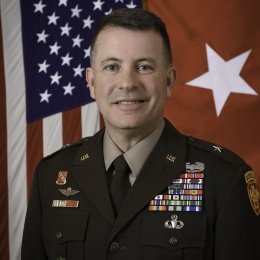
Brigadier General Shane P. Morgan ’94 Announced as the 2025 ROTC Joint Commissioning Ceremony Speaker
Norwich University is honored to announce United States Army Brigadier General Shane P. Morgan as the ROTC Joint Commissioning Ceremony speaker for the graduating Class of 2025.
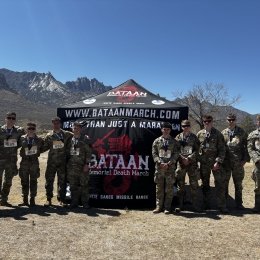
Norwich cadets earn recognition at 36th Annual Bataan Memorial Death March
Alpha and Bravo Teams placed in multiple divisions, earning a pair of trophies.

A Real-World Adventure
Meet the first-ever recipients of the Internship Accessibility Scholarship and learn about their summer of experiential learning.

